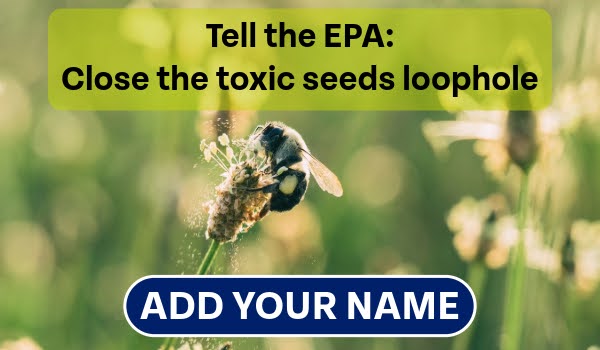

It's a loophole you could drive a tractor through, John.
It's well-documented that neonicotinoid pesticides kill bees. But because of an Environmental Protection Agency (EPA) loophole, if you put those pesticides on seeds, they're no longer considered a pesticide and there are barely any safeguards.1
It doesn't add up -- no matter how you use it, a pesticide is a pesticide. And it's killing bees.
Tell the EPA: Close the toxic seeds loophole.
Pesticide-coated seeds are planted across 150 million acres of American soil every year.2
And every place these toxic seeds go, bees are in danger.
When the seed absorbs the neonicotinoid (neonic), the chemical is taken up into every fiber of the plant as it grows. Its pollen, fruit, flowers, stem and leaves all pose a threat to bees.
But the pesticides don't just stay on the seeds or in the plants they grow into. Only about 5% of neonicotinoids (neonics) are taken up by the seed itself.3 Instead, they leach into the air, the ground and the water.
Neonics rub off the seeds during planting, creating a cloud of pesticide dust. Wind can blow the dust cloud onto nearby bee habitat, killing bees that fly into its path.
When the seed is planted, the pesticide coating seeps into the ground, contaminating the soil and the water. Many wild bees make nests in the ground, and could be building their homes in a toxic pile of dirt.
Seeds coated with neonics are poisoning bees. Add your name: The EPA should close the loophole and restrict pesticide-coated seeds.
The EPA has effectively tied its own hands behind its back.
History has shown us that pesticides can be incredibly toxic, and sweeping the problem under the rug can have deadly consequences.
DDT was so widespread that it almost caused the iconic bald eagle to be wiped off the face of the planet forever. And neonicotinoids? They're 1,000 times more toxic to bees than DDT was.4
Bees are dying and many bee species are being pushed to extinction. And unless we close the seeds loophole, neonicotinoids will continue to contaminate fields all over the country, poisoning more and more bees.
New York and Vermont recently passed laws that restrict the use of neonic-coated seeds, but bees everywhere else are in trouble until we get the EPA to address these bee-killing seeds on a national level.
Letting this toxic threat go unchecked is unacceptable.
Take action today to help save the bees from deadly neonic-coated seeds.
Thank you,
Ellen Montgomery
1. Steve Blackledge, "Seeds covered with pesticides are killing bees," Environment America, August 13, 2024.
2. Elizabeth Royte, "These widely used insecticides may be a threat to mammals too," National Geographic, February 5, 2021.
3. Elizabeth Royte, "These widely used insecticides may be a threat to mammals too," National Geographic, February 5, 2021.
4. Stephen Leahy, "Insect 'apocalypse' in U.S. driven by 50x increase in toxic pesticides," National Geographic, August 6, 2019.
Donate today. A cleaner, greener future is within our reach. Your donation today can help us bring the vision we share a little closer to reality.
Environment Colorado, Inc.
1543 Wazee St., Suite 400, Denver, CO 80202, (303) 573-3871
Member questions or requests call 1-800-401-6511.
Facebook | Twitter
If you want us to stop sending you e-mail then follow this link -- Unsubscribe
